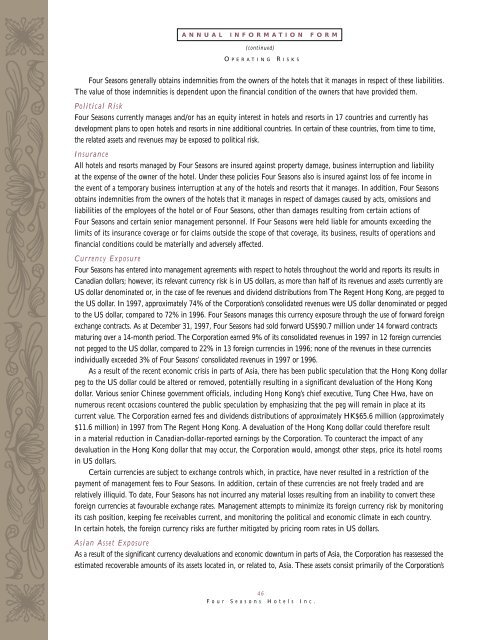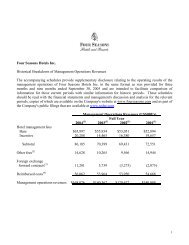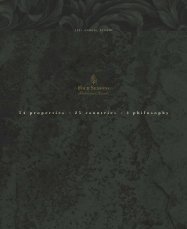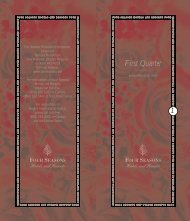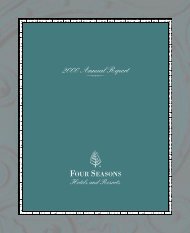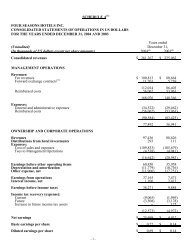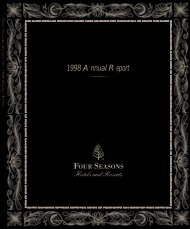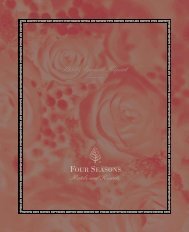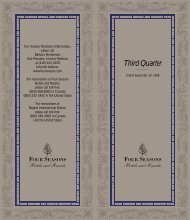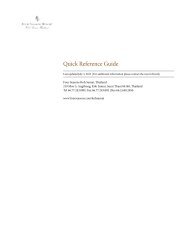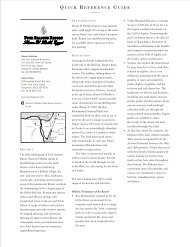1997 Annual Report - Four Seasons Hotels and Resorts
1997 Annual Report - Four Seasons Hotels and Resorts
1997 Annual Report - Four Seasons Hotels and Resorts
Create successful ePaper yourself
Turn your PDF publications into a flip-book with our unique Google optimized e-Paper software.
ANNUAL INFORMATION FORM(continued)O PERATINGR ISKS<strong>Four</strong> <strong>Seasons</strong> generally obtains indemnities from the owners of the hotels that it manages in respect of these liabilities.The value of those indemnities is dependent upon the financial condition of the owners that have provided them.Political Risk<strong>Four</strong> <strong>Seasons</strong> currently manages <strong>and</strong>/or has an equity interest in hotels <strong>and</strong> resorts in 17 countries <strong>and</strong> currently hasdevelopment plans to open hotels <strong>and</strong> resorts in nine additional countries. In certain of these countries, from time to time,the related assets <strong>and</strong> revenues may be exposed to political risk.InsuranceAll hotels <strong>and</strong> resorts managed by <strong>Four</strong> <strong>Seasons</strong> are insured against property damage, business interruption <strong>and</strong> liabilityat the expense of the owner of the hotel. Under these policies <strong>Four</strong> <strong>Seasons</strong> also is insured against loss of fee income inthe event of a temporary business interruption at any of the hotels <strong>and</strong> resorts that it manages. In addition, <strong>Four</strong> <strong>Seasons</strong>obtains indemnities from the owners of the hotels that it manages in respect of damages caused by acts, omissions <strong>and</strong>liabilities of the employees of the hotel or of <strong>Four</strong> <strong>Seasons</strong>, other than damages resulting from certain actions of<strong>Four</strong> <strong>Seasons</strong> <strong>and</strong> certain senior management personnel. If <strong>Four</strong> <strong>Seasons</strong> were held liable for amounts exceeding thelimits of its insurance coverage or for claims outside the scope of that coverage, its business, results of operations <strong>and</strong>financial conditions could be materially <strong>and</strong> adversely affected.Currency Exposure<strong>Four</strong> <strong>Seasons</strong> has entered into management agreements with respect to hotels throughout the world <strong>and</strong> reports its results inCanadian dollars; however, its relevant currency risk is in US dollars, as more than half of its revenues <strong>and</strong> assets currently areUS dollar denominated or, in the case of fee revenues <strong>and</strong> dividend distributions from The Regent Hong Kong, are pegged tothe US dollar. In <strong>1997</strong>, approximately 74% of the Corporation’s consolidated revenues were US dollar denominated or peggedto the US dollar, compared to 72% in 1996. <strong>Four</strong> <strong>Seasons</strong> manages this currency exposure through the use of forward foreignexchange contracts. As at December 31, <strong>1997</strong>, <strong>Four</strong> <strong>Seasons</strong> had sold forward US$90.7 million under 14 forward contractsmaturing over a 14-month period. The Corporation earned 9% of its consolidated revenues in <strong>1997</strong> in 12 foreign currenciesnot pegged to the US dollar, compared to 22% in 13 foreign currencies in 1996; none of the revenues in these currenciesindividually exceeded 3% of <strong>Four</strong> <strong>Seasons</strong>’ consolidated revenues in <strong>1997</strong> or 1996.As a result of the recent economic crisis in parts of Asia, there has been public speculation that the Hong Kong dollarpeg to the US dollar could be altered or removed, potentially resulting in a significant devaluation of the Hong Kongdollar. Various senior Chinese government officials, including Hong Kong’s chief executive, Tung Chee Hwa, have onnumerous recent occasions countered the public speculation by emphasizing that the peg will remain in place at itscurrent value. The Corporation earned fees <strong>and</strong> dividends distributions of approximately HK$65.6 million (approximately$11.6 million) in <strong>1997</strong> from The Regent Hong Kong. A devaluation of the Hong Kong dollar could therefore resultin a material reduction in Canadian-dollar-reported earnings by the Corporation. To counteract the impact of anydevaluation in the Hong Kong dollar that may occur, the Corporation would, amongst other steps, price its hotel roomsin US dollars.Certain currencies are subject to exchange controls which, in practice, have never resulted in a restriction of thepayment of management fees to <strong>Four</strong> <strong>Seasons</strong>. In addition, certain of these currencies are not freely traded <strong>and</strong> arerelatively illiquid. To date, <strong>Four</strong> <strong>Seasons</strong> has not incurred any material losses resulting from an inability to convert theseforeign currencies at favourable exchange rates. Management attempts to minimize its foreign currency risk by monitoringits cash position, keeping fee receivables current, <strong>and</strong> monitoring the political <strong>and</strong> economic climate in each country.In certain hotels, the foreign currency risks are further mitigated by pricing room rates in US dollars.Asian Asset ExposureAs a result of the significant currency devaluations <strong>and</strong> economic downturn in parts of Asia, the Corporation has reassessed theestimated recoverable amounts of its assets located in, or related to, Asia. These assets consist primarily of the Corporation’s46<strong>Four</strong> <strong>Seasons</strong> <strong>Hotels</strong> Inc.


